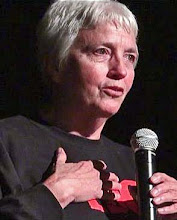The cardboard sign poked out from the doorway where the family huddled. As Chicago’s Magnificent Mile shoppers and tourists streamed obliviously by, this (apparently) homeless family (I’m guessing grandma by her appearance) scrunched on the concrete, out of the way of foot traffic, tattered cup propped by grandma’s feet, kids leaning on her like a beanbag chair, all trying not to hope for a miracle to release them from this panhandling hell.
If everyone who walked by in an hour would have given a dollar, their homelessness would have been solved for a month or so, assuming that money was the answer. Maybe lack of housing is just one stumbling block. Who knows?
While waiting to meet my NYC friends Heidi and Markus and their kids for dinner a few doors down from the family, I stood close enough to watch the action around them without being seen. Very few people stopped to drop money in the cup. One guy was so flummoxed he walked a few steps past them, reached for his wallet and dropped it, and almost got trampled by the ensuing traffic as he recovered it and went back to drop in a few bucks.
I’d venture a guess that most people didn’t even see this bedraggled, forlorn clan. The “Gold Girl” perched on a 5-gal. gold painted bucket in her gold painted dress with a song blaring in a feeble performance designed to attract donors about 30’ away. I mused about having a speaker blaring some music to attract attention to the family’s plight… “Give a Damn” or “Jesus Loves Me.”
This family posed quite a contrast in my mind and in the minds of my friends, too. They were quite concerned. Their question, why doesn’t Chicago have a “right to shelter” law like NYC? Good question.
Family values. I suppose if we asked the grandmother what was going on in her life, she might share the same story thousand of grandparents do—something happened to their daughter/son’s situation—they were locked up for some petty crime, got hooked on drugs, or just lost their ability to cope with being a parent—and they left, asking grandma/pa to take care of the kids until they returned. About 3 million grandkids are being raised by over 2.7 million grandparents, with median incomes of less than $36,000 a year.
Of all the issues I have heard about in my 3 decades of working in homelessness, and of all the topics people have asked me to make a documentary about, grandparents raising grandkids is at the top of the list.
My organization, HEAR US Inc., made a short video to help grandparents and guardians get their charges enrolled in the proper school. Often kids lose their housing and bounce around with others when their custodial parent gets locked up or otherwise disappears. Watch REACH, my free 11-min. video , to learn what rights kids have under the federal McKinney-Vento Homeless Education Act.
A few years ago I heard from a grandmother with custody of her homeless 8-year-old granddaughter. They had just been told that the little girl couldn’t return to her school because she wasn’t a resident. The astute grandmother knew this was wrong and researched this situation, leading her to HEAR US.
I told her about the film REACH. Her plan was to be in the school’s principal’s office first thing Monday morning. I assured her that her granddaughter would be reenrolled immediately, but told her I’d be waiting for a call if she needed backup.
This grandmother rocked her challenge! And she called to thank me. I know thousands more could use help. Here’s more info on this law.
The heartbroken Maryland grandmother, as she tried to explain why her daughter wouldn’t hurt her three-year-old son found dead after being swung around by the obviously distraught mother at a playground last week, said, “(Romechia) would never harm my grandson in any type of way. You know, I just believe she had some type of mental illness, some type of mental break that came upon her where she wasn't able to get herself out of that situation,” (WTSP-TV news story). Evidently the family was homeless.
My mind keeps tumbling back to the family in the doorway. The grandmother didn’t sign up for the task of printing their pleading message on a piece of cardboard with hopes that someone would rescue them from homelessness. At what level of desperation do you reach for the marker and cardboard and sit your grandkids around you? At what level of humanity do we decide that families count enough to provide access to shelter, mental and physical health care, and other essentials?
When we’re willing to let grandmothers and grandkids beg on the streets, we’ve hit a new low.









